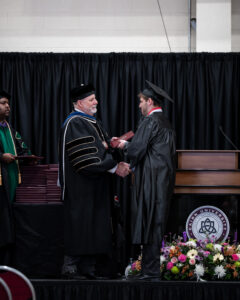Perspective: It’s an important word. It is full of meaning, and its implications are profound, both for us as individuals and for us as a society, a society that seems, at times, to have “lost all perspective,” as they say. But it is also a word we must take caution with, because if we begin to define it too loosely, our use of it diminishes the impact an accurate understanding of the term can really have. I recently asked a group of university students what they thought it meant. They replied it is how you “feel” about something or someone. And therein lies the problem. If perspective is merely how we “feel” about something or someone, if it is simply our response, reaction, or preferential leanings toward something or someone, then we have no responsibility to consider our perspective, develop it, or alter it. If we “feel” it, that makes it truth, essentially gospel truth. But perspective is so much more than a feeling about someone or something.
The Oxford Learner’s Dictionary defines perspective as “a particular attitude toward something; a way of thinking about something.” This is significant. Perspective is an attitude (which is another word often misused), an evaluation, if you will, of someone or something. It is more than a point of view, how you see things from where you stand. It’s a word that means that we are thinking about those “someones” or “somethings;” that we are forming reasoned conclusions; and that we are not simply being driven by our emotional reactions to an issue, an event, or a person. And when we lose that “perspective,” the definition of the term can be applied as well. In fact, the second definition in The Oxford Learner’s Dictionary is “the ability to think about problems and decisions in a reasonable way without making them seem worse or more important than they really are.”
This dictionary exercise illustrates how important it is to understand the term we are using in a way that will allow us not only to use it more effectively but to benefit from that proper understanding. Words aren’t just expressions of our own thoughts or feelings; they are tools for deepening our understanding whose meanings we share in common. If we allow this cultural moment to turn “perspective” into a personal emotional reaction, a preferential bias, or even simply a point of view without acknowledging that it requires thoughtfulness and reason, we will not be able to interact with one another on critical issues, solve serious problems, or care for and maintain meaningful relationships. Perspective matters. And when someone says “from my perspective…”, it would be helpful if we could assume that there was some reason for it. And then we could get on with the work of attempting to understand one another’s perspectives and challenging them on the basis of the thinking behind them without it becoming more personal, more emotional, and more contentious.
The very nature of this column, “From a Faith Perspective,” has significance. It means that those who have a commitment to either a faith as a tradition or as a theological construct of belief apply that to developing their perspective on others, ideas, things, and events. As an evangelical Christian, I take personal faith in the Triune God to have very practical implications for the way I think and live, for the perspectives that I hold. The Bible never uses the word “perspective.” But it does talk about the importance of sound judgment, of reason, of wisdom, and of diligent evaluation that is fairly applied and consistent with the principles and teachings of Holy Scripture. In this way, the Bible and faith in the God of the Bible shape my perspective, my attitudes, and my ways of thinking.
In Romans 12:2, the Apostle Paul writes, “Do not be conformed to this world, but be transformed by the renewal of your mind, that by testing you may discern what is the will of God, what is good and acceptable and perfect.” This is an exhortation to be diligent and careful about how we think and to test and evaluate people and things, ideas and events. It is an exhortation to think according to faith and Scripture. This Christian teaching is that our minds, our ways of thinking, and our perspectives are not to be merely points of view, responses and reactions to things based upon our feelings, or our preferences. It is a discipline to be undertaken. And it is meant to make us personally stronger and make the community of which we are a part stronger as well.
From a faith perspective then, I might ask, what are the things that have shaped your “perspective” or “perspectives?” On what basis do you hold the conclusions that you make about people (specifically or humanity in general); about ideas; about events; and about solutions to the problems of our lives, our relationships, our society, and the world? These are questions worth considering, and the conversation will be much more impactful if we think rightly about exactly what “perspective” is.
This article first appeared in-print in the Bucks County Courier Times on June 19, 2022.



![Debbie Lynn Wolf [400]](https://cairn.edu/wp-content/uploads/2023/11/Debbie-Lynn-Wolf-400-300x300.gif)
